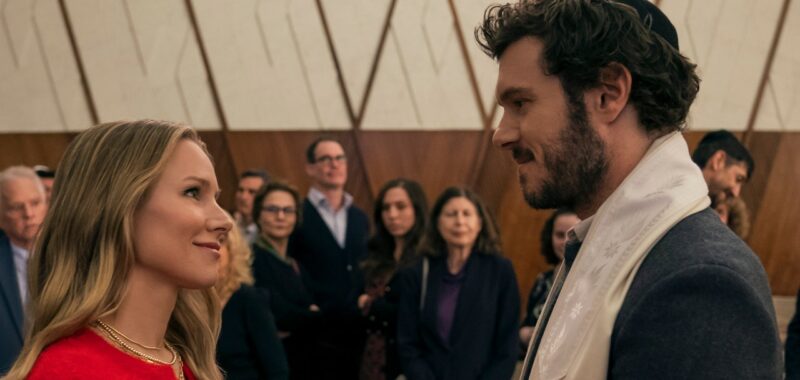In fact, after I watched the first two episodes of Nobody Wants This, I called my mom and said, âI canât imagine any guy who watches this show who would then say, âI really want to date a Jewish girl!â We come off as controlling, marriage-hungry women who want to plan dinner parties and alienate anyone who doesnât share those same dreams.â
Take Rebecca, Noahâs soon-to-be ex-girlfriend, who is so desperate to get engaged to him that she manages to find the key to his private desk drawer, which stores the engagement ring he planned to give her, and then starts wearing it publicly. (âYou were clearly going to propose anyway, and I donât know what was taking so long. So now we can skip past the âWill you marry me?â part because I say yes!â she says without realizing how delusional she sounds.)
Or what about Noahâs sister-in-law, Esther, who seems to exist on screenâat firstâfor the purpose of nagging her husband, Sasha. Granted, he often acts like a 13-year-old boy who would be totally lost without her, but itâs still such an outdated Jewish trope of the controlling/annoying wife who canât stand their other half.
I give slightly more grace to the character of Bina, Noah and Sashaâs mother, who is an immigrant from Russia, and raised to believe that her sons can only marry a Jewish woman. Itâs true for many Jewish families, and while so many Jewish mothers nowadays just want their kids to be happyâregardless of sexual orientation or religious beliefs in a partnerâI have more understanding of the world sheâs coming from.
But the moment that frustrated me the most occurs at the end of the first episode, in which Noah has just finished his sermon when a few Jewish mothers swarm him in hopes of introducing their single daughters to them. (If these mothers could have planned a wedding on the spot, they probably would have done that, too.) âShe just got over shingles!â one exclaims. âShe just graduated from hospitality school,â says another. Itâs meant to be humorous, I guess, but itâs lazy and offensive. Itâs all done, of course, so that Noah will excuse himself to say hello to Joanne, who has come to see him. When Esther asks Bina who that is, Noahâs mother angrily responds, âA shiksa,â as if sheâs the number one enemy to Jewish single women everywhere.
As I look back, Iâm a bit surprised I continued to watch. I love being Jewish, and I love that the Jewish religion has taught me to always welcome others and never leave anyone out. This scene at the temple is the exact opposite of what we Jews are taught to doâwelcome thy neighbor. At a time when antisemitism is at the highest levels weâve seen since the Holocaust, scenes like this hit me hard.
Call it curiosity, then, that I did watch more. And to my surprise, I really, really enjoyed it. As the series went on, Esther and Rebecca softened and became less like caricatures. Joanne made an effort to learn about Noahâs world, and he hers. (Granted, sheâs far from perfect either.) I could say more about the way Joanne and her sister, Morgan, are lionized by the Jewish guys in the show, which, again, felt stereotypical, but for the most part, I was so invested in Noah and Joanneâs charming, hilarious, and sexy relationship to let it get to me.

